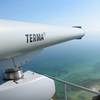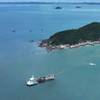Congress Passes Port Security Bill
"By passing the SAFE Port Act, we’re gratified that Congress recognizes it needs to have a greater financial partnership with U.S. ports to pay for critical seaport security measures,” said Mr. Nagle. “Yet, for this upcoming fiscal year, dramatic differences remain between the amount Congress recommended for port security and what it will actually fund.”
Referencing the Department of Homeland Security’s fiscal year 2007 appropriations bill just passed by Congress, Mr. Nagle said only about half of the PSG funding authorized in the SAFE Port Act ($210 million of the $400 million) was actually appropriated. He stated that helping secure U.S. public port facilities—which handle 99 percent of the country’s overseas imports and exports—must be made a higher priority within the federal budget. In an effort to match actual funding with the amount authorized for port security grants in H.R. 4954, Sen. Robert C. Byrd (D-WV) proposed an amendment to the DHS appropriations bill that would have provided an additional $190 million from unspent FY 2006 funds. Losing by one vote, a House-Senate conference committee decided to drop that amendment from the final bill.
Further evidencing the shortfall in port security grant funding, DHS this week announced the recipients of the FY 2006 Port Security Grant program, which will distribute $168 million to 50 port areas to help pay for security enhancements like landside surveillance, access controls, interoperable communications and systems to prevent and detect improvised explosive device attacks. AAPA’s President Nagle noted that needs identified in PSG applications this round alone totaled more than $550 million, and a number of significant security improvement projects at America’s ports received no funding. “To date, due to limited appropriations levels, only about 20 percent of security needs identified in the grant applications have been able to be funded,” he added.










